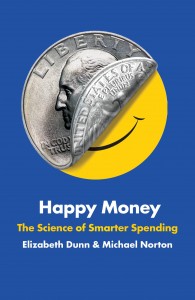Your last paycheck was gone before you got it.
A good chunk of it was earmarked for housing. You had to pay for your new car, and gas. Everybody’s favorite Uncle took his share, you have this nasty little habit called “eating,” and there you go: a few dollars left for fun, which is no fun at all.
But what if stretching your meager wealth also stretched your well-being? In the new book “Happy Money: The Science of Smarter Spending” by Elizabeth Dunn & Michael Norton, you’ll find out how.
You have a love / hate relationship with money: you love getting it and hate when you don’t have it. But as Dunn & Norton point out, you can utilize discretionary lucre to give you a better life, thus making you happier. In their research, they discovered five main Principles of Happy Money.
First of all, shift from buying things and spend your money on events. The vacation you took, the concert you attended, that dream fishing trip are etched in your mind far firmer than, say, last Tuesday’s commute in your new car – especially if those special events were experienced with someone else.
Remember when an impulsive ice cream cone tasted like the best thing in the world? Reach back to those kinds of feelings by ending your spending and making indulgences into treats. When something is rare, it brings happiness because abundance “is the enemy of appreciation.” Even the littlest treats don’t have to cost a lot.
Use your money to buy time, especially when it comes to commuting, TV-watching, and socializing. Your fancy abode is no bargain if you have to commute for hours to pay for it. That big-screen TV is a commitment of one-sixth of your year. And socializing doesn’t have to cost anything at all.
Learn to “pay now, consume later,” since studies show that anticipation for an item is far more pleasurable than the item itself. That’ll give you more time to imagine and savor – and besides, you’ll be happier if you’re debt-free.
Finally, invest in others. Research indicates that giving away money is “just as rewarding as getting more of it.”
There’s a reason why you’ve never seen a Happiness Store at the mall: turns out Mom was right when she said money can’t buy happiness. It can, however, buy “Happy Money,” which is a good start.
And here’s more good news: most of the things inside this book are easy to do. You might already be following the Principles that authors Elizabeth Dunn & Michael Norton espouse – and if you’re not, they won’t be hard to embrace. The appeal of this book, therefore, is to change the way you think about what’s in your wallet or pocket, whether it’s meager or millions.
I liked this book, its gentle humor, and the sense it makes. I think that if you’re tired of being dissatisfied with what you’ve got, you’ll like it, too. “Happy Money” may not change your bankbook, but it will give you pennies for your thoughts.





